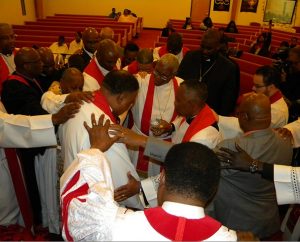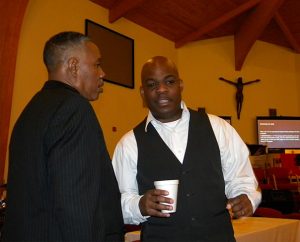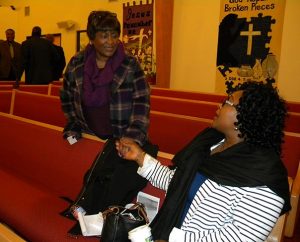By Joe Isenhower Jr.
DALLAS — The term “21st-century ministry” came up often at the Jan. 14-16 LCMS Black Clergy Caucus (BCC) gathering here as a priority for ministry.
In fact, the caucus asked its executive committee to look into changing the name of the caucus to that moniker and possibly make a recommendation to that effect at the next caucus meeting in July.

And in major presentations, the caucus learned of what could be considered 21st-century ministry models in the LCMS, including:
- a Hot Springs, Ark., congregation’s mentoring program that serves 150 young people every month and trains mentors that include seven local police officers; and
- an inner-city Detroit congregation’s program with an “outdoor-VBS” sports camp for youth looking for something to do and a job-training feature for those who are unemployed or underemployed.
Another major presentation here suggested ways to beef up and locate funding for ministries.
Among the caucus event’s 43 participants were 32 pastors, including five representatives of LCMS African-immigrant congregations — an indication that a priority of past caucus gatherings and the 2014 LCMS Black Ministry Family Convocation to include more African-immigrant congregations in Synod Black-ministry activity is being fulfilled.
“This caucus is one of the first we’ve had in the 21st century that has identified the fact that we have to, as Lutherans, serve our communities in a different capacity,” said LCMS Black Ministry Director Rev. Roosevelt Gray Jr.
From Gutenberg to Google
“The way we served 30 or 40 years ago was wonderful and brought many people into the kingdom,” he continued, “but we have to use our Lutheran substance in our more modern and technological age to reach the new population of people. I believe that our Lutheran faith that was started in a Gutenberg era can be effectively applied for this Google society. In this 21st century, we understand that we’re going to have to do it differently — not substance-wise, but perhaps the style in which we serve ethnic and minority communities.”

Gray praised the major presentations on mentoring as “highlighting new ways we can conduct such ministries.”
In those presentations:
- the Rev. Amos Gray, a pastor at First Lutheran Church, Hot Springs, who leads the congregation’s “Lifehouse Tutoring and Mentoring” program, told the story of the effort that draws 150 youth there each month.
Gray said it began in 2010 when a handful of the congregation’s youth told him they wanted “to reach their friends in their schools, to live out their faith so that they can stand out and know that Jesus Christ is in their lives and use their spiritual gifts. … Students wept as they talked about friends who didn’t know Jesus.”
Now Lifehouse is reaching out to students in three area schools and gets referrals from the local court system. At the middle- and high-school levels, that includes teaching character education in health and career-orientation classes. Lifehouse has trained 25 current mentors for outreach.
Gray told the story of how the seven police officers joined the mentoring program.
The city’s assistant chief of police arranged a time to talk with Gray about involving his triplets in confirmation class. He brought along the chief of police. This was last year, just after the police-officer shooting death of Michael Brown in Ferguson, Mo., which led to demonstrations, looting and other unrest in that municipality.
The Hot Springs chief told Gray, “I’ve been wrong,” as he asked forgiveness for never meeting with a leader “of color” in the three years he had been in the post. He said he didn’t want what’s happened in Ferguson to also happen in Hot Springs.
“Can you teach me how to build relationships across racial lines?” the chief asked Gray.
As a result — in addition to the seven police officers joining the congregation’s mentoring program — the chief of police and Gray arranged summits of community leaders to talk with the chief about police and community relations. They also made plans for a similar summit for the police chief and young people in Hot Springs.

“You have people in your community who care for young people,” Gray told the caucus audience. “All they’re looking for is someone to call. There’s no better thing than giving your life away to someone else.”
- the Rev. Chris Bodley spoke about “Acts 2 Enterprise,” a mission of the LCMS Michigan District “to help reposition churches in the urban context, using a holistic model.” Bodley is a missionary at-large for the district and pastor of Bethany Lutheran Church, an inner-city Detroit congregation.
He said that 40 years ago there were 19 LCMS congregations within Detroit’s city limits — most of them with schools. Now there are no churches there with schools and as many as six of those congregations have closed.
Bodley said that Bethany decided to “rebrand ourselves … in the spiritual perspective” for community outreach. So the congregation conducted a neighborhood survey, asking what the three greatest concerns were there. The top answers: urban blight, no activity for youth and unemployment.
To counter youth inactivity, Bethany hosted its first “sports camp” in 2013 — in conjunction with LCMS Michigan District President Rev. Dr. David Maier, who encouraged congregations across the state to support the endeavor. In 2014, with $44,000 in donations, two similar events took place in Detroit’s east and west sides, with churches sending teams of volunteers.
Summer missionaries
“We told them, ‘you are a summer missionary,’ ” Bodley said of the volunteers.
For the unemployed and underemployed, Bodley said that Bethany and Acts 2 Enterprise applied “Jobs for Life” — “a biblically-based, Christ-centered curriculum that agencies can use to help people gain soft skills.” And since the program started, the Department of Human Services (DHS) in Detroit has established a satellite office at Bethany. The congregation also has a “professional closet” with donated clothing appropriate for job interviews.
Bodley said the eight-week soft-skills training that taps the expertise of volunteers “offers many opportunities for Christian mentoring. It’s our time for discipling — to let them know we love them [and] want the best for them.”
Christine Weerts — an LCMS Lutheran from Selma, Ala., who is an adviser in fundraising and communications to several nonprofits in that state — also advised the caucus assembly on fundraising and grants during a major presentation. She covered a myriad of potential funding sources and techniques.
“I am impressed with how dynamic and engaging our LCMS black clergy are, both in worship and outreach,” Weerts told Reporter after the event here. “They are front-line ministers in many inner cities, serving as Christ’s hands and feet to those in great need. They also are reaching youth and working with local schools to help impact and raise up the next generation.”
In other presentations to the caucus:
- the Rev. Dr. John Loum, director of the Ethnic Immigrant Institute of Theology at Concordia Seminary, St. Louis, spoke of the need to recruit more church workers of color and thanked the caucus for including African-immigrant pastors and congregation representatives in the gathering here.
- the Rev. Greg Manning of New Orleans highlighted the work of Rebecca’s Garden of Hope, an LCMS Recognized Service Organization that he described as “chang[ing] lives and communities through mentoring and tutoring.” The organization provides resources for 80-some partners.
- the Rev. Dr. Victor Belton of Atlanta helped caucus participants identify potential church leaders of color to be recommended for congregations to nominate this year for positions in the Synod.
- the Rev. Dr. Bryant Clancy of St. Louis gave a report on “facts” about the 2014 Black Ministry Family Convocation in Kansas City. He noted that it was “significant” that 18 of the 25 LCMS districts with black-ministry congregations were represented there.
Clancy was the Synod’s black-ministry executive from 1990 until his retirement in 2002.
A ‘bridge moment’
Clancy told Reporter that he considered the caucus gathering here as a “bridge moment” and “transition time,” as evidenced by its emphasis on mentoring by pastors and others and on 21st-century ministry.
“I feel good about that,” he said.
Clancy also commended Black Ministry Director Gray as “a good leader with the right vision for black ministry. We are onto the right issues.”
In his sermon for the Jan. 14 caucus Communion service, Gray emphasized the importance of “being our brother’s keeper.”
“To be 21st-century Lutheran missionaries, we’re going to have to be one another’s keepers as we move forward in this 21st century,” he said. “And the first thing as we think about being our brothers’ keepers is to see the One who mentors us in our own lives — Jesus Christ, our Savior, our Brother and our Friend.”
Gray also led a two-hour meeting of the advisory council for LCMS Black Ministry, where items discussed included:
- the need to support the Synod’s “The First Rosa” film project toward its completion and availability this year. The film honors the work of Dr. Rosa J. Young, the black educator in Alabama who was instrumental in starting schools and churches across the state’s Black Belt and the establishment of what is now Concordia College Alabama, Selma.
- the proposed creation of “Rosa J. Young International Academy public schools” — public charter schools on properties of LCMS congregations that would provide mentoring and other services to academy students.
“We are exploring the possibility of working with a charter-management organization that would collaborate with Black Ministry to operate these charters, and then we would have members on the local boards,” Gray told Reporter.
- creation of a national mentoring organization for black ministry, with mentors based at congregations serving the international academies and other schools.
Caucus business
In addition to the proposal to change the Black Clergy Caucus name to “21st-Century Ministry,” the caucus also decided during its business session to:
- ask its executive committee to work with the caucus constitution and bylaws “to do what is necessary” for the caucus to apply for 501c3 nonprofit status.
- designate the Communion-service offering of some $440 toward “The First Rosa” film project, in addition to a donation of $500 from the caucus for that project.
- encourage BCC congregations to have an offering so that each congregation might donate $500 to “The First Rosa” project.
- “recognize African-immigrant brothers for their participation in this caucus.”
- thank St. Paul Lutheran Church, Dallas, for hosting the caucus.
The Rev. Byron Williams Sr., caucus president and pastor of that congregation, conveyed his thoughts about this caucus event via email.
“I feel the gathering of the Black Clergy Caucus accomplished its objectives,” Williams wrote. He noted that the caucus is “more inclusive toward reaching out to our African-immigrant pastors. We also wanted to have a forum that would address some of the challenges we face as pastors in leading our congregations in economic development. It is our desire to strengthen the whole person. I feel the presenters did an outstanding job in presenting this kind of information.”
Posted Jan. 29, 2015




